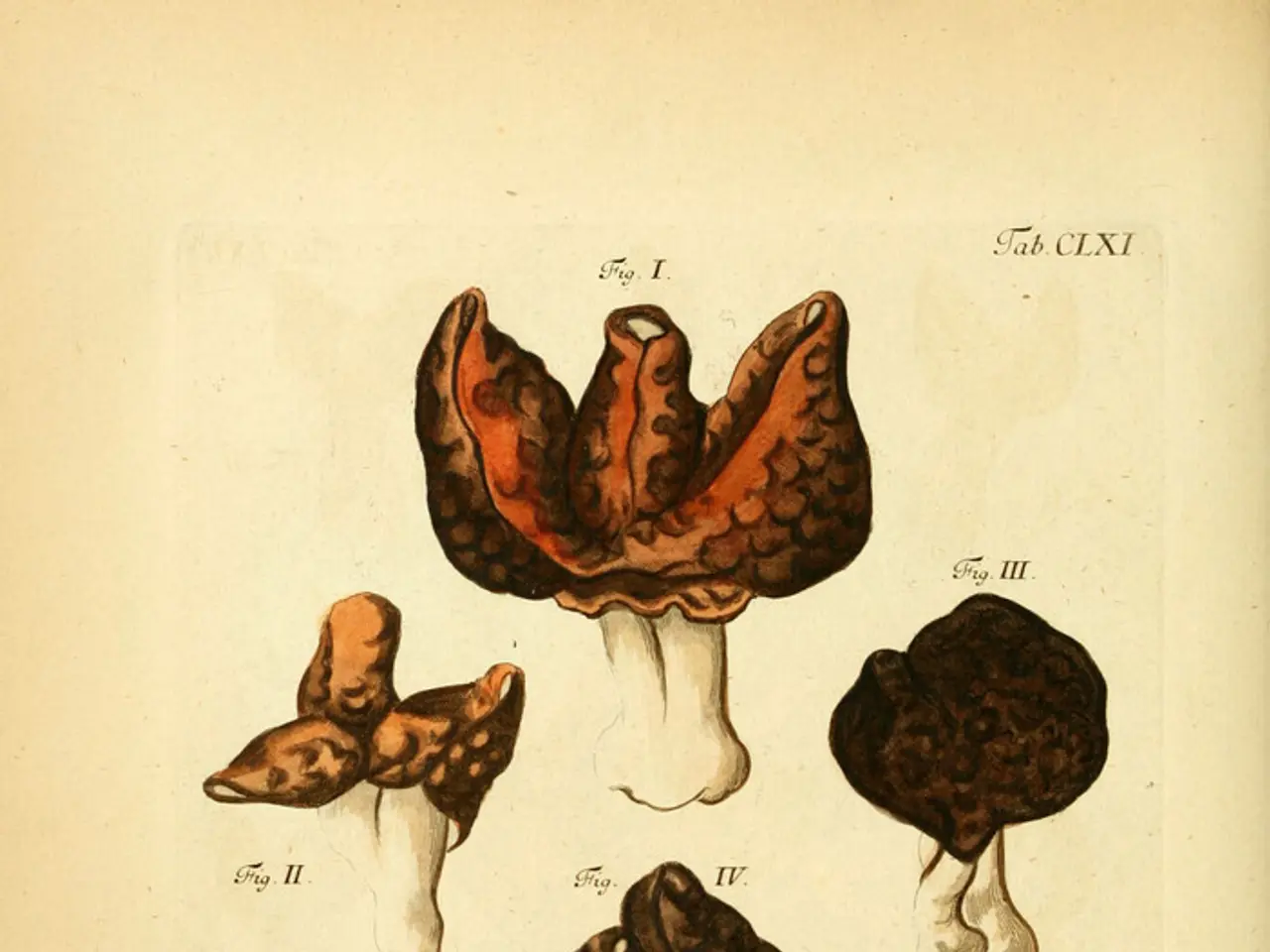Psychedelic compound psilocybin found in magic mushrooms under the spotlight
In the realm of natural substances, psilocybin has garnered significant attention for its hallucinogenic properties and potential therapeutic applications. Beyond its recreational use, recent research suggests that psilocybin may offer long-term benefits and hold promise in treating various medical conditions.
Psilocybin, a hallucinogenic chemical found in certain mushrooms, works by binding to and activating serotonin receptors in parts of the brain. This interaction can lead to a range of effects, including visual or auditory hallucinations, distorted perception of objects and people, and changes in sensory perception and thought patterns. However, it's important to note that the use of magic mushrooms comes with risks, such as the potential for poisoning from picking the wrong types of mushrooms and the risk of psychological distress, particularly for those with pre-existing mental health conditions.
Despite these risks, psilocybin shows promise in helping to treat or manage addiction, depression, end-stage cancer, and mood disorders in medical settings. A 2023 study found that a single 25 mg dose of psilocybin, when combined with psychological support, led to a clinically significant reduction in depressive symptoms in 104 adults over six weeks. Another 2022 review suggests that psilocybin may have therapeutic potential for treating depression, particularly in people with depression or suicidal ideation.
Research also indicates that psilocybin may help treat depression and anxiety due to end-stage cancer. Furthermore, psilocybin-assisted therapy is being explored for its ability to disrupt rigid, maladaptive thought patterns and enhance emotional processing, showing particular promise for depression, PTSD, and anxiety.
Beyond mental health disorders, psilocybin is being studied for its efficacy in treating various substance use disorders, including alcohol, nicotine, and opioid dependence. Its capacity to promote neural adaptability and induce profound insights may help individuals reframe destructive behaviors and support sustained recovery.
The long-term benefits of psilocybin extend beyond its therapeutic applications. Recent studies using human cells found that psilocybin’s active metabolite, psilocin, can significantly extend cellular lifespan, delay cellular senescence, preserve telomere length, reduce oxidative stress, and increase expression of SIRT1, a protein linked to regulating longevity and DNA repair. In aged mice, psilocybin treatment improved survival rates and appeared to promote healthier aging by improving physical markers like fur quality.
Psilocybin also stimulates the growth of new neurons and enhances neural connections, potentially aiding recovery from mental health disorders through brain plasticity. This neurogenic effect also opens a "critical window" for behavioral repatterning, helping individuals break free from entrenched habits and mental health challenges.
While the potential benefits of psilocybin are promising, it's crucial to approach its use with caution. The European Monitoring Centre for Drugs and Drug Addiction (EMCDDA) reports that the hallucinogenic effects of psilocybin usually occur within 30 minutes after ingestion and last between four and six hours. However, after several days of psilocybin use, people may experience psychological withdrawal and have difficulty adjusting to reality. Higher doses and pre-existing mental health conditions may increase the risk of psychological distress, and some people may experience persistent, distressing alterations to how they see the world, known as visual flashbacks.
In conclusion, while psilocybin is a Schedule I substance, meaning it is believed to have a high potential for abuse and no legitimate medical purpose by the Drug Enforcement Administration (DEA), recent research suggests that it may offer multi-faceted long-term benefits and hold promise in treating an expanding scope of mental health conditions, addiction recovery, neurodegenerative diseases, chronic pain, and healthy aging. However, further human studies are necessary to establish optimal dosing, safety profiles, and long-term efficacy before widespread therapeutic use can be fully endorsed.
- Psilocybin, discovered in certain mushrooms, interacts with serotonin receptors in the brain, potentially leading to hallucinations and changes in thought patterns.
- Despite the risks associated with its use, psilocybin has shown promise in treating mental health conditions like depression, addiction, and anxiety, particularly when combined with psychological support.
- A study in 2023 found that a single 25mg dose of psilocybin led to a significant reduction in depressive symptoms over six weeks, while a 2022 review suggested therapeutic potential for depression, especially in those with suicidal ideation.
- Psilocybin may also aid in treating depression and anxiety associated with end-stage cancer, and its capacity to promote neural adaptability could help individuals reframe destructive behaviors.
- Beyond mental health disorders, research indicates that psilocybin could be effective in treating substance use disorders, including alcohol, nicotine, and opioid dependence.
- Psilocybin's long-term benefits extend beyond therapy, as it has been found to extend cellular lifespan, delay cellular senescence, preserve telomere length, and reduce oxidative stress, potentially promoting healthy aging.




